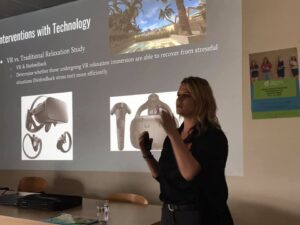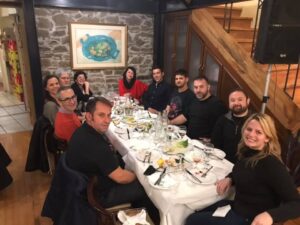Though Florida State University is often considered one of the top higher education institutions in the nation, our faculty members and students routinely make contributions to their fields that garner international attention as well. Three students from our Sport Psychology program participated in a unique conference that had them presenting to an international audience in Greece.

The three students are Yonatan Sarig, a third-year Ph.D. student and FSU Sport Psychology Lab coordinator; Carly Block, a second-year Ph.D. student; and Nat Boiangin, who graduated from the program after completing a master’s and Ph.D. in 2019. The three attended the Sport & Exercise Psychology Postgraduate Level Intensive Course, which is held annually in Europe. The intensive course represents a collaboration of universities around the world, and students gather to attend the conference to learn and share research. “The professors in Greece were thrilled to invite us to talk about the use of technology in sport psychology since the FSU Sport Psychology Lab and the work we do using tech is well known and appreciated within the international sport psychology community,” says Sarig.
Presenting at the Conference
The trio of FSU-affiliated presenters focused their presentation on three parts: how to use technology in research, in applied settings, and then a demonstration of said technology. In the intimate setting of the conference, observers could ask questions and have discussions that promoted an exchange of research and ideas. The intensive course also allowed the FSU team to demonstrate a pilot experiment involving eye tracking technology. This demonstration was so productive that the FSU team hopes to publish a collaborative publication on it!

The FSU Sport Psychology Lab has gained an international reputation for its use of technology, and the team brought a number of the tools they use in the lab to the conference. In addition to the aforementioned eye tracking technology, the FSU team demonstrated effective use of the EEG cap, which measures information processing; strobe glasses, which help train anticipation and decision making; and motion analysis tools that measure behavioral responses. Beyond the tech itself, the team walked the audience through their innovative model that they use while working with clients. This includes strategies like self-talk, goal-setting, focus techniques and more. On top of the presentations, the team enjoyed an unforgettable experience at the conference. During social events, the FSU team connected with peers from around the world. Between the exchange of ideas, the new connections, and the presentations, the Sport & Exercise Psychology Postgraduate Level Intensive Course will be an experience that these FSU students never forget.


